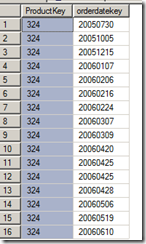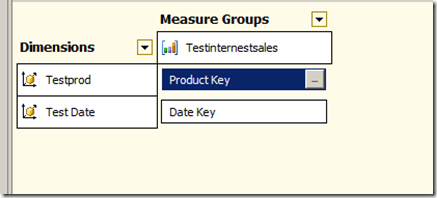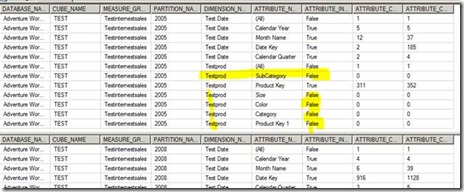ProcessUpdate–Insight
ProcessUpdate applies only to Dimension. It is the equivalent of incremental dimension processing in Analysis Services 2000. It sends SQL queries to read the entire dimension table and applies the changes—member updates, additions, deletions.
Since ProcessUpdate reads the entire dimension table, it begs the question, "How is it different from ProcessFull?" The difference is that ProcessUpdate does not discard the dimension storage contents. It applies the changes in a "smart" manner that preserves the fact data in dependent partitions. ProcessFull, on the other hand, does an implicit ProcessClear on all dependent partitions. ProcessUpdate is inherently slower than ProcessFull since it is doing additional work to apply the changes.
Depending on the nature of the changes in the dimension table, ProcessUpdate can affect dependent (related) partitions. If only new members were added, then the partitions are not affected. But if members were deleted or if member relationships changed (e.g., a Customer moved from Redmond to Seattle), then the aggregation data and bitmap indexes on the related partitions are dropped. The cube is still available for queries, albeit with lower performance.(with ProcessUpdate Flexible aggregations and indexes on related partitions will be dropped)
After ProcessUpdate you need to Process Indexes on the Partitions. The simple approach of dealing with such problem is to do default processing on associated Cubes, default processing will create dropped Aggregations and Bitmap indexes for affected partitions.
Three Options you can use for building Indexes / Aggregates -
Lazy processing is the mechanism by which the Analysis server automatically builds bitmap indexes and aggregations for dimensions and partitions. Lazy processing is done in the background at a low priority, so it does not interfere with foreground operations such as user queries. The advantage of lazy processing is that it reduces the foreground processing time and the cube is available earlier to users, albeit with lower performance.
2) ProcessAffectedObjects while Processing Dimension (Process Update) - that tells the server to reprocess other objects impacted by this command, benefit of this is All Affected Objects will be process in same Batch.
3) Process Index on Measure Groups or Process Default of a Cube
Here are Few scenarios to show impact of ProcessUpdate:
Scenario A: Update a Product Color (Attribute Key is Color) for a single Product which had a Historical Record in Year 2005 and 2006.
1) If you notice for this specific product got sales only in Year 2005 and 2006
select ProductKey,orderdatekey from testinternestsales
where Productkey=324
2) Created A Test Cube based on TestDate and TestProd-
TestDate –
TestProd
With Color – it got Flexible Relationship.
Four Partitions based on –
2005 WHERE OrderDateKey <= '20051231'
2006 WHERE OrderDateKey >= '20060101' AND OrderDateKey <= '20061231' and same was for 2007 / 2008
Dimension Usage
Key Col and Name Col is Color.
3)Auto-Slicing is correct, can be proved by simple query –
Select {[Measures].[Sales Amount]}on 0,[Testprod].[Product Key 1].&[324] on 1
from [Test] WHERE [Test Date].[Calendar Year].&[2005]
4) SELECT * FROM SYSTEMRESTRICTSCHEMA($SYSTEM.DISCOVER_PARTITION_DIMENSION_STAT
, CUBE_NAME = 'TEST' , DATABASE_NAME = 'Adventure Works DW 2008R2' ,MEASURE_GROUP_NAME = 'Testinternestsales'
,PARTITION_NAME = '2005')
Checking if Indexes are in Place, if you notice here For Color in all years Indexes are in Place.
5)Also checked in Folder
E:\data\Adventure Works DW 2008R2.0.db\TEST.40.cub\Testinternestsales.40.det\2008.37.prt
E:\data\Adventure Works DW 2008R2.0.db\TEST.40.cub\Testinternestsales.40.det\2005.36.prt
Colro.Map files are in place
6)Fired this query for updating Color for ProductID 324 (As shown earlier it got records only for 2005 and 2005 in Fact Table)
update testprod
set color='Test Green'
where productkey=324
7) Process Update
Fired same DMV and if you notice Attribute Index for Color is dropped for 2005 as well as 2008
Scenario B: Update a Product Color (Attribute Key is Color) for a product which doesn’t have any record in fact table (No History or Current Record)
You can see all flex Aggregates
Changed – Color of a Product, which does not have any record in Fact table
After Process Update – all flex aggregates are gone only Index files are left that too for all attributes except Color
Scenario C In earlier mentioned Scenario – Color is Key Column, for testing I have changed the Key Col – ColorID and Name Col. Kept as Color.
Changed Color
update testprod set color='ASAT' where productkey=609
So in this case, I am updating a color but internally I am referring ColorID as Key Column for this Color Attribute. Which internally is not impacting Index Mapping and hence not dropping indexes / aggregates
If your design is somewhere near to Scenario 1 or 2, Indexes / Aggregates will get dropped but if you are following the practice given in Scenario 3, It will not drop indexes because it’s not impacting the Key Col (and that’s why it’s a suggested practice to use Name Col for Attributes).
Scenario D: Dropped a record from Dimension and shown an impact on Aggregates. as expected its dropped all Attribute Indexes (Map files) and Flex Aggregates
SELECT * FROM SYSTEMRESTRICTSCHEMA( $SYSTEM.DISCOVER_PARTITION_STAT , CUBE_NAME = 'Test', DATABASE_NAME = 'Adventure Works DW 2008R2' , MEASURE_GROUP_NAME = 'Testinternestsales' , PARTITION_NAME = '2005')
Aggregates are present.
SELECT * FROM SYSTEMRESTRICTSCHEMA($SYSTEM.DISCOVER_PARTITION_DIMENSION_STAT
, CUBE_NAME = 'TEST' , DATABASE_NAME = 'Adventure Works DW 2008R2' ,MEASURE_GROUP_NAME = 'Testinternestsales'
,PARTITION_NAME = '2005')
Now fired below mentioned query for checking indexes
SELECT * FROM SYSTEMRESTRICTSCHEMA($SYSTEM.DISCOVER_PARTITION_DIMENSION_STAT
, CUBE_NAME = 'TEST' , DATABASE_NAME = 'Adventure Works DW 2008R2' ,MEASURE_GROUP_NAME = 'Testinternestsales'
,PARTITION_NAME = '2005')
ProductKey 611 doesn’t existing in Fact Table
This signify that we don’t have record for this guy
delete from testprod
where productkey=611
Now if you notice all flex aggs are dropped you can see size as 0
Indexes - for all attributes are dropped because we have deleted a record and it had impacted all Attributes





![clip_image001[6] clip_image001[6]](https://msdntnarchive.z22.web.core.windows.net/media/MSDNBlogsFS/prod.evol.blogs.msdn.com/CommunityServer.Blogs.Components.WeblogFiles/00/00/01/14/37/metablogapi/0317.clip_image0016_thumb_02990EF0.png)
![clip_image002[6] clip_image002[6]](https://msdntnarchive.z22.web.core.windows.net/media/MSDNBlogsFS/prod.evol.blogs.msdn.com/CommunityServer.Blogs.Components.WeblogFiles/00/00/01/14/37/metablogapi/7142.clip_image0026_thumb_4DE88CE7.jpg)
![clip_image003[6] clip_image003[6]](https://msdntnarchive.z22.web.core.windows.net/media/MSDNBlogsFS/prod.evol.blogs.msdn.com/CommunityServer.Blogs.Components.WeblogFiles/00/00/01/14/37/metablogapi/0383.clip_image0036_thumb_0EE6E67F.png)
![clip_image004[6] clip_image004[6]](https://msdntnarchive.z22.web.core.windows.net/media/MSDNBlogsFS/prod.evol.blogs.msdn.com/CommunityServer.Blogs.Components.WeblogFiles/00/00/01/14/37/metablogapi/2018.clip_image0046_thumb_7DD292CE.png)
![clip_image005[6] clip_image005[6]](https://msdntnarchive.z22.web.core.windows.net/media/MSDNBlogsFS/prod.evol.blogs.msdn.com/CommunityServer.Blogs.Components.WeblogFiles/00/00/01/14/37/metablogapi/0336.clip_image0056_thumb_71A0F2DA.png)
![clip_image002[11] clip_image002[11]](https://msdntnarchive.z22.web.core.windows.net/media/MSDNBlogsFS/prod.evol.blogs.msdn.com/CommunityServer.Blogs.Components.WeblogFiles/00/00/01/14/37/metablogapi/7752.clip_image00211_thumb_7190CD0D.jpg)

![clip_image001[10] clip_image001[10]](https://msdntnarchive.z22.web.core.windows.net/media/MSDNBlogsFS/prod.evol.blogs.msdn.com/CommunityServer.Blogs.Components.WeblogFiles/00/00/01/14/37/metablogapi/2475.clip_image00110_thumb_1E65E44F.png)

![clip_image002[13] clip_image002[13]](https://msdntnarchive.z22.web.core.windows.net/media/MSDNBlogsFS/prod.evol.blogs.msdn.com/CommunityServer.Blogs.Components.WeblogFiles/00/00/01/14/37/metablogapi/2045.clip_image00213_thumb_11B7EB99.jpg)
![clip_image004[9] clip_image004[9]](https://msdntnarchive.z22.web.core.windows.net/media/MSDNBlogsFS/prod.evol.blogs.msdn.com/CommunityServer.Blogs.Components.WeblogFiles/00/00/01/14/37/metablogapi/3034.clip_image0049_thumb_6C1E486A.jpg)



